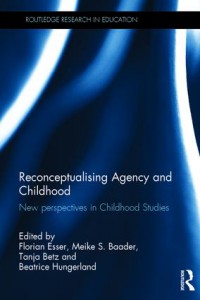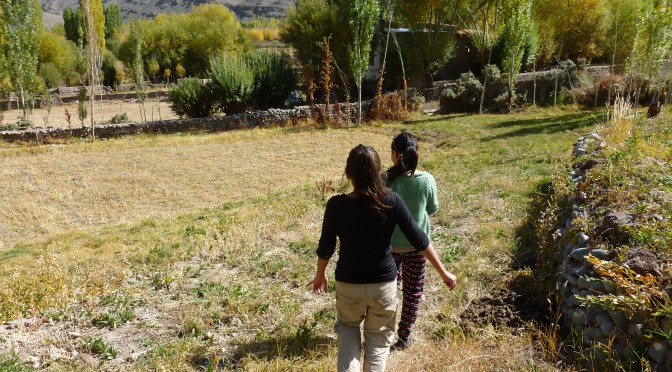 “Reconceptualising Agency and Childhood. New perspectives in childhood studies”. You can find more at the publisher’s website www.routledge.com/products/
“Reconceptualising Agency and Childhood. New perspectives in childhood studies”. You can find more at the publisher’s website www.routledge.com/products/
Monthly Archives: March 2016
Seeking manuscripts on the study of rural childhoods, memory work, and visual media
We are developing an edited book with McGill-Queen’s University Press with the working title Our rural selves: Memory, place, and the visual in Canadian rural childhoods. This text brings together three areas of inquiry, children’s rural geographies, memory work, and visual studies (through, for example, photographs, picture books, TV programs, film, and digital spaces). Continue reading Seeking manuscripts on the study of rural childhoods, memory work, and visual media
AAA CFP: Drugs, Coloniality, and Indigenous People
Organizers: Juliana Willars (Texas State University) and Autumn Zellers León (Temple University)
When Europeans arrived in the New World, they encountered a vast array of psychoactive plants, such as coca, peyote, tobacco, and ayahuasca, which Indigenous people had been using long before colonization. While settler colonialism led to displacement and genocide of Indigenous communities, the integration of some of these plants and their derivatives into the global market created new paradigms of psychoactive use unprecedented in human history. Continue reading AAA CFP: Drugs, Coloniality, and Indigenous People
AAA CFP: Kinship and Contingency
Call for papers: 115th AAA Annual Meeting, “Evidence, Accident, Discovery,” Minneapolis, MN, November 16-20, 2016.
Apologies for cross-posting. Please send your 250 word abstracts to Catherine Koehler at ckoehler@ucmerced.edu by APRIL 5, 2016, to be considered.
This is a 2016 AAA panel sponsored by the Committee on Labor Relations (CLR) and will be part of a double session with a roundtable organized by Committee on Gender Equity in Anthropology (CoGEA).
Kinship and Contingency
Co-organizers: Samantha Gottlieb (University of California, Berkeley) and Catherine Koehler (University of California, Merced)
Discussant: Rayna Rapp (New York University)
Session abstract (max 500 words):
The academic workforce is increasingly “casual,” where 75% of higher ed faculty now hold contingent positions (Coalition on the Academic Workforce 2012). By some estimates, women comprise between 51-61% of the contingent academic labor force (National Center for Education Statistics 2009; Coalition on the Academic Workforce 2012). In the behavioral and social sciences, fields like psychology, where women hold the majority of faculty positions, are also the fields with the highest rates of faculty contingency; conversely, fields like economics and political science, where women make up only 14.3% and 15.9% of faculty, respectively, are the least casualized (Finley 2009). Data on anthropologists are harder to come by, and this panel seeks to engage our community on the growing numbers of contingent workers.
The dual casualization and feminization of the academy should, perhaps, be unsurprising. The association between adjunct and women’s labor is longstanding; the spousal appointment has its origins in “faculty wives” accepting adjunct work when the professoriate was still closed to women, and female scholars were typically relegated to adjunct work under similar conditions as the early “housewives of higher education” (Schell 1998). That contingency has historically been structured and imagined through gendered kinship relations, then, raises questions about how kinship continues to condition academic labor markets, inform experiences of precarity, and shape discourses surrounding academic work, and how kinship formations are modified, in turn. Concurrently, how might these markets and forms of precarity in turn shape kinship formations?
How does caregiving—of children, partners, parents—affect the career trajectories and experiences of contingent academic workers? Further, in what ways does care-work in the academy—of departments and disciplines through service, of students through mentoring, and of students and colleagues through unpaid and unrecognized emotional labor—intersect with contingency? Are the kinship formations available to academic workers attenuated by precarity? If working conditions in the field sciences are structured by and experienced through kinship in particular ways—the restrictions, possibilities, and complications, for example, of bringing children and families to the field, or where the field is “home”—how does this affect the precariat, in particular? In what ways is scholarly productivity shaped by the kinship relations and obligations of contingent academic workers? Are first-generation scholars—those without kinship ties to the academy—more likely to experience contingency, or to do so in distinct ways? How are we, as anthropologists, implicated in these practical and intellectual binds?
This session invites personal, empirical, and ethnographic examinations of kinship and contingency, broadly conceived. We seek papers from a range of institutional positions, both inside and outside the academy, and across anthropological sub-fields and related disciplines. This panel will be part of a double session, following a roundtable co-sponsored by the Committee on Gender Equity in Anthropology (CoGEA).
Want to Liven Up Your Teaching and Scholarship Related to Children and Youth?
The ACYIG website provides access to a vast amount of resources to facilitate
teaching and research.
By Bonnie Richard (Website Manager & Blog Editor) & Sara Thiam (Content Coordinator for Blog & Social Media)
Our interest group has developed a very useful (and always growing) repository of resources for teaching and research related to the anthropology of children, youth, and related topics. Continue reading Want to Liven Up Your Teaching and Scholarship Related to Children and Youth?
(Re)Examining Historical Childhoods Conference
(Re) Examining Historical Childhoods: Literary, Cultural, Social
An Australasian Society for the History of Children and Youth Symposium
December 12-13, 2016 – Melbourne, Australia – Deakin University
In this inaugural Australasian Society for the History of Children and Youth symposium, we are keenly interested in bringing together scholars of the history of children and childhood to consider new perspectives, new methodologies, and new cross- disciplinary frameworks that will enrich the field. We invite proposals for panels, papers, or roundtables that explore histories of children and youth from any place and in any era. Continue reading (Re)Examining Historical Childhoods Conference
Neos highlights — Childhood and Contradiction
Are you looking to bring a different perspective on child labor into your classroom? In the February 2016 issue of Neos, Megan Hinrichsen explores the tension between the childhood that parents of working children are told they should provide and the reality of their everyday lives. Read her article “Childhood and Contradiction: Illustrations of the Ideal Childhood and Child Labor in Urban Ecuador” (pp. 12-13) and others at http://acyig.americananthro.
Children & Society seeks new journal editor(s)!
Children & Society: Call for Editor(s)
Children & Society is an international, interdisciplinary journal publishing high quality research and debate on all aspects of childhood and policies and services for children and young people. Continue reading Children & Society seeks new journal editor(s)!

